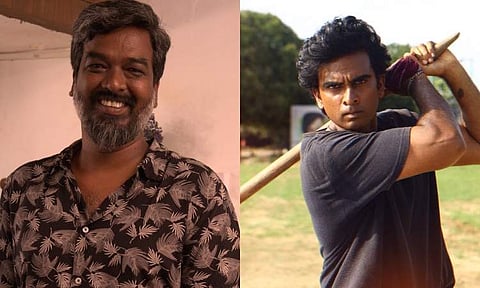

Director George Lucas once said, ‘All films are personal’. The statement rings truer when someone—untouched by the grip of commerce and hype—makes their first film. Director S Jayakumar, who has debuted with the sports drama, Blue Star, begins by sharing the origins of this film. He says, “The film is based on my own experiences growing up in Arakkonam.” But he’s quick to clarify that Blue Star is not just about his nostalgia; it’s an attempt to open communication with the viewers. “I wanted to ask our society many questions and I have done that with this film. There’s also my dream of an ideal society that I could explore in this film.”
In the film, Shanthanu Bhagyaraj plays a character named Rajesh, who hails from a dominant caste and heads a local cricket team. Rajesh starts off as a prejudiced individual who often clashes with the head of a rival cricket team (Ranjith, played by Ashok Selvan), who belongs to an oppressed community. However, Rajesh’s belief in his own sense of superiority crumbles when he notices where he’s placed in the hierarchy. Jayakumar doesn’t think Rajesh has transformed into a better person entirely. “I think he may not have banished all his beliefs,” he says, smiling. “He just becomes a friend to Ranjith, but yes, he begins reconsidering his value system. People like Rajesh, in real life, don’t behave this way and they don’t come out of their oppressive beliefs. But Rajesh just might. I don’t expect casteists to completely change, but I’ll be happy just to see them question their beliefs.” Jayakumar shares the inspiration behind this philosophy by quoting one of his favourite filmmakers. “Wong Kar Wai once said that the role of a screenwriter is to ask questions and not to answer them. The audience will learn the answer. This was running through my mind as I was writing my film.”
The inspiration behind Blue Star runs deeper than a quote from an auteur. Jayakumar, who also wrote the film, goes back to a distressing incident that was the starting point for the film—and which also directly influenced a scene. “There is a scene where Rajesh comes over to Ranjith’s house to collect debt and he calls Rajesh’s mom by name in a disrespectful manner. I saw this happen in my life and found it infuriating. I kept mulling over how social inequalities result in such disrespect.” But Jayakumar noticed even in his life that things changed once many people from different communities played cricket together. “Sport is a great equaliser. After you start engaging in a group activity together, you really get to know the person and your outlook on them changes. Maybe all our problems are because we don’t know other people well.”
The protagonist, Ashok Selvan’s Ranjith, is also drawn from his life—specifically, his elder brother. Would the younger brother in the film, Sam, played by Prithvi, be him then? “Yes! I am very much like Sam. I used to write corny love poems and I thought they were good,” he says, laughing. Jayakumar tugs at these threads of nostalgia and recollects fond memories of his formative years in Arakkonam and how it was important to him to capture the beauty of the location. Trains, as we know, are an inseparable part of life there. However, instead of using them just as props, the trains become an additional layer to the storytelling itself. “The trains we see in the film communicate emotions. During intense sequences, we see them speeding… During intimate, romantic moments between Ranjith and Anandhi (Keerthi Pandian), we see them slowing down.”
I ask about the criticism he faced for the ‘brown face’ of Ashok Selvan that many felt added to the stereotyping of people from oppressed communities. “I merely portrayed what I saw in real life. Arakkonam is one of the hottest towns in Tamil Nadu and if you keep playing outdoors all day, you are bound to get dark.” He then adds, “I was also criticised for making Anandhi swear but she is very much a reflection of the wonderful women I came across in my life. Take my wife for instance… She too talks like Anandhi.”
With a gamut of real experiences influencing his debut film, where might he draw from for his next? “Arakkonam has a wealth of stories and Blue Star is based on just a small part of my life,” he says. He also doesn’t necessarily think that all creativity needs to come from direct, personal experiences. “There are amazing books out there, and then there is all our history. For example, I am currently reading a book on emperor Ashoka and the Kalinga war, and it blows my mind. I hope I get to make a film on it some day.”